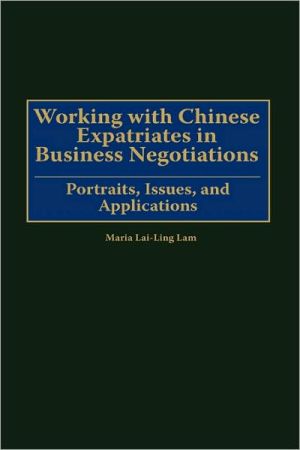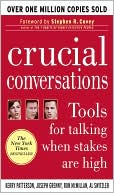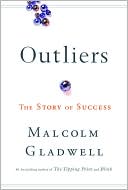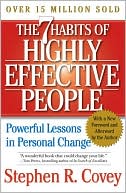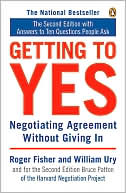Working With Chinese Expatriates In Business Negotiations
This is a study of Chinese expatriates who are working for American clients that seek joint ventures and other business relationships with mainland Chinese business and governmental organizations. The main focus of the study is how these Chinese middlemen and women work to create harmonious business relationships between members of the two very different cultures. The data and the interpretations will be of keen interest to any American business seeking to conduct joint ventures and other...
Search in google:
Explains how Chinese expatriates work to create harmonious business relationships between members of two very different cultures in Chinese-U.S. joint ventures and other forms of commerce.
Prefacexiii1.Introduction1Background2Methodology5U.S. and Chinese Negotiation Styles6Looking Ahead: An Overview82.General Portraits of Chinese Expatriates9General Characteristics9Chineseness (Minzu)9Chinese Expatriates' Work10Preparation10Negotiation11Post-negotiation12Concerns During Negotiation12Summary12Objectives13Strategies13Compensation Strategy and Developing Norms of Reciprocity14Case Study: Interviewee 4414The "Little Cheating Strategy"15The "Little Integrative Strategy"15Summary15Major Obstacles15Problems of American Representatives16Case Study: Interviewees 32 and 3321Problems of Chinese Representatives26Imperfect Translation and Interpretation30Summary33Ways of Establishing Relationships Between U.S. and Chinese Representatives34Relationship Patterns Between the Americans and the Chinese34Strategies and Tactics in Triangular Relationships34Resource Dependence36Expatriates' Advantages over Americans in Developing Trusting Relationships37Why Interviewees Prefer Developing Relationships with the Chinese Representatives39Conclusion41A Rationale for Classifying Interviewees into Five Types433.Type I Interviewees47Characteristics47Authority and Roles48Defense of the Chinese Bureaucratic System49Case Study: Interviewee 4649Case Study: Interviewee 2350Case Study: Interviewee 1351Perceptions of American Representatives' Problems53Case Study: Interviewee 856Case Study: Interviewee 457Summary58Perceptions of Chinese Representatives' Problems58Trust-Building and Cross-Cultural Understanding59A Representative of Type I Interviewees: Miss Chan60Conclusion684.Type II Interviewees70Characteristics70Advocacy of Local Chinese Practices73Perceptions of American Representatives' Problems75Perceptions of Chinese Representatives' Problems77Trust-Building and Cross-Cultural Understanding78A Representative of Type II Interviewees: Miss Lee81Conclusion935.Type III Interviewees94Characteristics94Advocacy of U.S. Professional Practices96Perceptions of American Representatives' Problems100Perceptions of Chinese Representatives' Problems100Trust-Building and Cross-Cultural Understanding103A Representative of Type III Interviewees: Mr. Ho104Conclusion1096.Type IV Interviewees111Characteristics112Characteristics of Type IV Interviewees112Inexperienced Type IV Interviewees112Experienced Type IV Interviewees113Summary114Advocacy of American Corporate Practices114Perceptions of American Representatives' Problems116Perceptions of Chinese Representatives' Problems117Case Study: Interviewee 47118Trust-Building and Cross-Cultural Understanding119A Representative of Type IV Interviewees: Mr. Wong121Conclusion1297.Type V Interviewees131Characteristics131Perspectives on Conducting U.S.-China Business134Perceptions of American Representatives' Problems136Perceptions of Chinese Representatives' Problems136Trust-Building and Cross-Cultural Understanding138Case Study: Interviewee 27138A Representative of Type V Interviewees: Mr. Cheung140Conclusion1458.Conclusions146Work Issues146Influence of Chinese Culture146Paradoxes151Suggested Training Strategy153Implications156Conclusion158AppendixInterview Guideline160Notes163References171Index183
